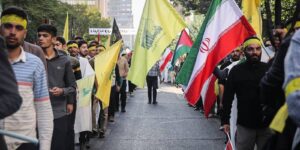
Iran's Grip in Lebanon Must be Broken
The ceasefire that went into effect in the early hours of November 27, 2024, must mark the beginning of the effort to break Iran's grip
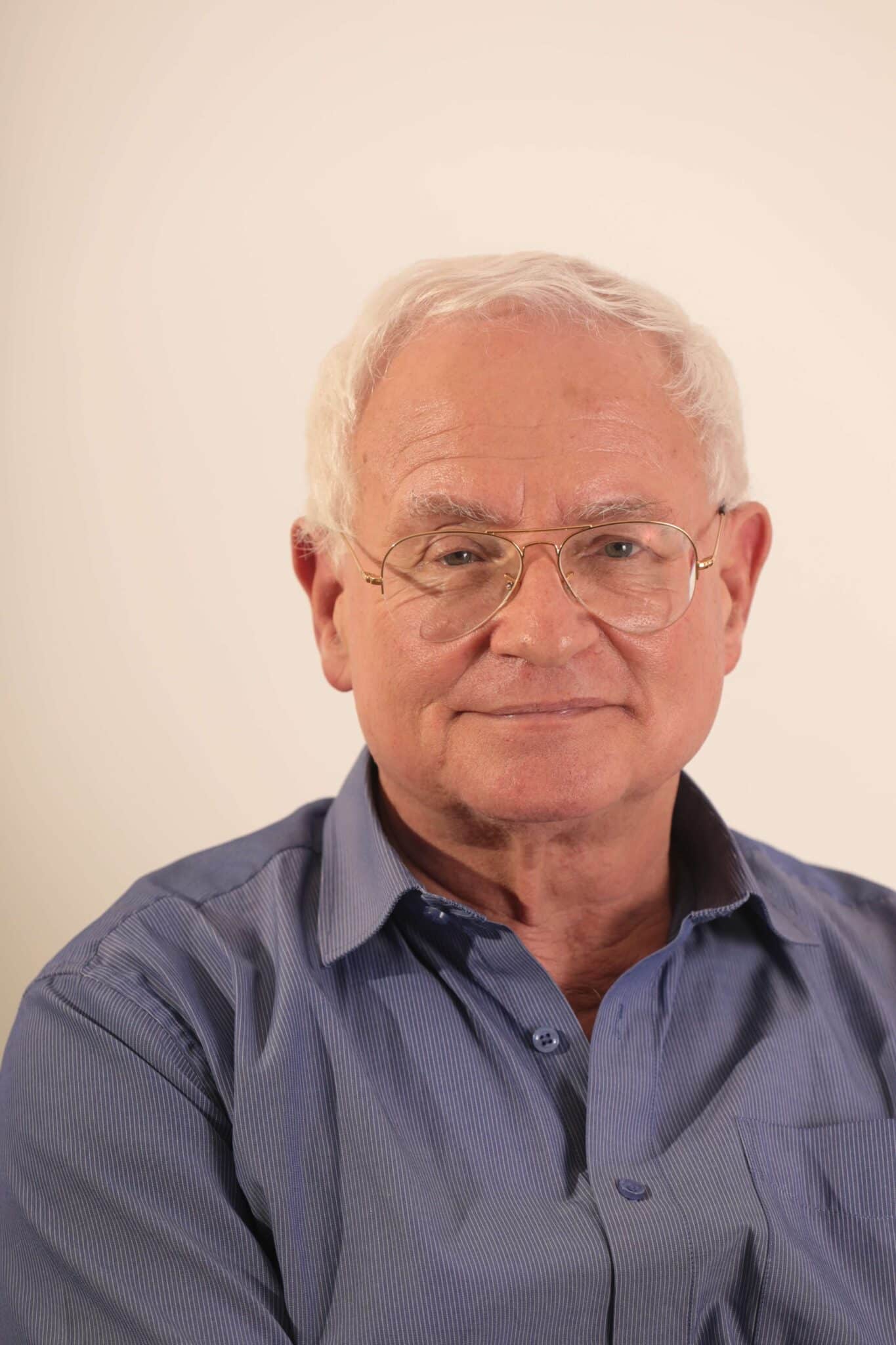
ד"ר לרמן הוא שימש כסגן למדיניות חוץ ועניינים בינלאומיים במועצה לביטחון לאומי. הוא מילא תפקידים בכירים בצה"ל במשך למעלה מעשרים שנה. הוא שימש במשך שמונה שנים כמנהל המשרד לישראל והמזרח תיכון של הוועד היהודי האמריקני. הוא מלמד בתוכנית ללימודי המזה"ת במכללת שלם בירושלים, ובתוכניות לתואר שני באוניברסיטת תל אביב ובמכללה לביטחון לאומי. הוא מומחה ליחסי החוץ של ישראל ולמזרח התיכון. צבר, דור שלישי בארץ, ד"ר לרמן הוא בעל תואר דוקטור מאת London School of Economics, ובהמשך הקריירה קיבל תואר שני במנהל ציבורי (MPA) מאוניברסיטת הרווארד.

The ceasefire that went into effect in the early hours of November 27, 2024, must mark the beginning of the effort to break Iran's grip

Has the concept of deterrence, long a cornerstone of Israel's defense doctrine, been rendered largely irrelevant? Do the lessons of the war so far –

Since October 7, the Biden administration has talked tough on Iran and its proxies, however its actions have been constrained by domestic and strategic considerations. Whoever wins the U.S. presidential elections will need to be far more resolute if they are to be denied their bid for regional hegemony.

Hassan Nasrallah's threats to broaden the scope of the war serve as a reminder of the importance of Israel’s sea lanes of communication as a strategic frontier, and of its cooperation with these key Eastern Mediterranean nations – with whom it shares common threat perceptions.

Nearly a year has passed since Hezbollah initiated a mid-intensity conflict with Israel, ostensibly to "support" Hamas in Gaza (a goal it failed to achieve)
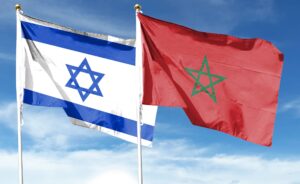
Executive Summary As its remarkable history indicates, the relationship between Morocco and Israel is unlike any other in the region. Even in these troubled times,

Against the background of Hamas' ongoing war with Israel (and the expressions of support for it among Palestinians and Islamists in Jordan), the Iranian regime has intensified its efforts to subvert the Hashemite monarchy. The arrests in March 2024 of Iranian agents involved in smuggling arms to Muslim Brotherhood elements in Jordan are part of a campaign to counter the role of Tehran in bringing both drugs and weapons over the Syrian and Iraqi borders into Jordan. Tensions rose further over Jordan's supportive role in foiling the Iranian attack on Israel on 14 April 2024. For the Iranian regime, the destabilization of Jordan is a vital precursor for the strategic goal of turning Judea and Samaria into "another Gaza", as Supreme Leader 'Ali Khamenei suggested back in 2014: hence the importance of American and Israeli support for Jordan. The stability of the Kingdom (and thus the need to reduce economic and social strains) is a vital interest of both Israel and the West.
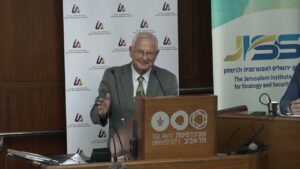
The lecture was part of the session on the Middle East Regional Powers' Struggle in Africa at the "Africa and Israel: Building Strategic and Economic Bridges" conference held on July 2, 2024, at Tel-Aviv University. The conference is a collaboration between the S. Daniel Abraham Center for International and Regional Studies at Tel-Aviv University, the Israel-Africa Relations Institute (IAI), and the Jerusalem Institute for Strategy and Security (JISS).

As the Arab world fell apart after 2011, one way to navigate the new realities in the region was through the identification of ideological "camps", at conflict with each other. While radical jihadists such as Islamic State (Da’esh), which was at the peak of its power a decade ago, are no longer real challengers for hegemony in the region, two other variations on the theme of Islamist totalitarianism – the Muslim Brotherhood camp, including Hamas, backed by Qatar and Turkey; and the Iranian revolutionary camp, and its proxies – are still actively seeking to overthrow the existing order, and to grow in power as the American role recedes. Facing both is the camp – loosely defined as the “camp of stability” – to which Israel belongs by right, and which acted together in foiling Iran's attack on Israel (April 14, 2024). This mapping of the region lends the war in Gaza a broader significance: it is bound to have a long-term effect, insofar as the survival of Hamas would change the balance of power between the "camps".
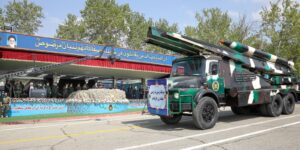
Iran's assault on Israel changed the rules of the regional game – but as Israel's measured response indicates, it is not yet a point of transition for Israel from its focus on Gaza to a broader regional war. The withdrawal of the IDF’s 98th Division from Khan Younis did not signal a termination of the effort to destroy Hamas: rather, it was taken in preparation for the next stage, that must involve the creation of conditions for the displaced population in the Rafah area to be evacuated to the north, in the context of a military campaign conducted with growing attention to the needs of the Gazan population. But in the absence of a clear formulation for "the day after," Israel's choices are likely to be misinterpreted as signs of incoherent policy.

Israel’s urban warfare experience in Gaza can benefit allies

Some Israelis fear US plans to build an off-shore pier to deliver humanitarian aid to Gaza could interfere with Israel’s war objectives. However, given the agreed interest in the success of the humanitarian effort, and the track record in recent years of close Israeli coordination with the US Central Command (CENTCOM), this could be a building block towards a coherent "day after" strategy, if political imperatives on both sides do not get in the way.
סה״כ 242 מאמרים בעברית
180 מאמרים
באירוע שבו הציג את יוזמתו לסיום המלחמה בעזה הרעיף הנשיא טראמפ שבחים על שליטי קטר ותורכיה, והזכיר בחטף גם את תרומתן של…
מלחמת "חרבות ברזל" להסתעפויותיה, כמו גם מבצע "עם כלביא", הם במידה רבה חלק ממלחמה רחבה הרבה יותר המתנהלת זה כמה עשורים. אפשר…
כאשר יצא לדרך "תהליך ברצלונה", לפני 30 שנה, נתלו בו תקוות מרובות, הן בהיבט הכלכלי והן כגורם מסייע, להלכה, ביישוב סכסוכים באגן…
ההתפתחויות האחרונות בלבנון – החלטת הממשלה, המַתְוָוה (לפחות להלכה) לוח זמנים לפירוק חיזבאללה מנשקו; האירוע בוואדי זבקין, שבו נהרגו שישה מחיילי צבא…
הנקודה החמישית בהחלטת הקבינט (31 ביולי 2025) באשר להמשך המערכה בעזה, המציבה כיעד את הקמתו של שלטון אזרחי שאיננו זרוע של הרשות…
בהתנהלותם של גורמי הממשל האמריקני במהלך המשבר בהר הדרוזים נשזרו נימות התייחסות סותרות שתרמו למבוכה ול"זִגזוג" בירושלים, וכמסתבר – גם בדמשק. מחד…
תוצאותיה המרשימות של המערכה באיראן יצרו מציאות מדינית חדשה במערכת האזורית. נודעת חשיבות רבה – מעשית וסמלית – גם לכך שלא באה…
במהלך העימות הצבאי האינטנסיבי אך הקצר במאי 2025, המוגדר בהודו כ"מבצע סינדור" (Sindoor), שהחל בפעולת תגמול הודית נגד יעדי טרור בעקבות הפיגוע…
נוכח הלחץ הבינלאומי, יש להתוות "עתיד אחר" בעזה, ולבסס את הלגיטימיות של מיטוט חמאס
נורמליזציה מלאה בין ישראל לערב הסעודית, רצויה ככל שתהיה, אינה עומדת על הפרק בטווח המיידי, היינו, בזיקה לביקור הנשיא דונלד טראמפ באזור.…
בתיאום עם וושינגטון, על ישראל לייצב מרחב חיץ ביטחוני בסוריה, למנוע השתלטות תורכית מלאה, להגן על מי שקשרו את גורלם איתנו, ולהסתייע…
במסגרת המהלכים הרחבים הנדרשים לבניין הכוח ולהתוויה מחדש של תפיסת הביטחון – כפי שהוצעו במאמרו של פרופ' אפרים ענבר, "השינויים העיקריים הנחוצים…
השלום עם מצרים – "קר" ככל שיהיה – הנתפס בקהיר כ"בחירה אסטרטגית", הוא מרכיב חיוני לביטחון הלאומי של מדינת ישראל, ויש לשמור…
מהלך ממשל טראמפ לחדש דיאלוג פוליטי ישיר עם רוסיה (ללא תיאום עם אוקראינה ומדינות אירופה) מצטרף לשורת צעדים נמרצים המעצבים מחדש את…
הטלטלה שחוללו התבטאויותיו של הנשיא דונלד טראמפ לגבי עתיד עזה – פינוי האוכלוסייה, שליטה אמריקנית, מודל של שיקום למעין "ריביירה מזרח-תיכונית" –…
יש יסוד לדאגה באשר לנושא האיראני: אישים המזוהים עם עמדה תקיפה כלפי איראן הורחקו, וחלק מן המינויים בדרג הביניים (כמו גם סגן…
האירועים בסוריה, ובעיקר תפקידן של המיליציות המורדות הנתמכות על ידי תורכיה, חיזקו פעם נוספת את המחנה האזורי המזוהה עם תנועת האחים המוסלמים.…
הנשיא הנבחר דונלד טראמפ, האישים שמונו על ידו לתפקידי מפתח בתחומי מדיניות החוץ, והדרג הצבאי האמריקני המקיים את הרציפות בין הממשלים, יידרשו…
קריסת משטר אסד היא מהלומה אסטרטגית ראשונה במעלה לאיראן, כמו גם לרוסיה, ולמעשה – לציר הסיני-רוסי-איראני-צפון-קוריאני שנראה היה, לכאורה, שיש בכוחו להציב…
החלטת מועצת הביטחון 1701 (12 באוגוסט 2006) הייתה פרי מעורבות ישירה של ממשלת ישראל דאז במהלכים המדיניים הרב-צדדיים, שנועדו להביא לסיומה של…
לכאורה, מתקפת חמאס ב-7 אוקטובר 2023, והצטרפותו (למחרת) של ארגון חיזבאללה ללחימה, כמו גם המערכה שבה פתחו החות'ים בתימן נגד השיט בים…
משטר המהפכה האסלאמית באיראן ממלא תפקיד מרכזי בניהול המלחמה הרב-זירתית נגד ישראל ובערעור היציבות האזורית; מחמש ומדרבן את מערך השלוחים, ובכללם חיזבאללה…
הנחיית הדרג המדיני ששיבת העקורים בצפון תצורף למטרות המלחמה של ישראל – ומה שמסתמן כמהלך רחב היקף לפגיעה בחזבאללה באמצעות הזימוניות של…
הטלטלה הפוקדת את הזירה הפוליטית בארה"ב לקראת בחירות 2024 זורה אור גם על התמורות המסתמנות במפה הרעיונית האמריקנית.
על רקע המלחמה שיזם חמאס נגד ישראל, וגילוי התמיכה בו בקרב פלסטינים ואסלאמיסטים בירדן, הגביר המשטר האיראני את מאמציו לקעקע את המונרכיה…
ניצחונו (בהפרש ניכר) של ג'ורג' לאטימר בהתמודדות על מועמדות המפלגה הדמוקרטית לבית הנבחרים מטעם המחוז ה-16 של מדינת ניו יורק היא אירוע…
אזהרתו של חסן נצראללה (19 ביוני 2024) כי ארגונו יפגע בקפריסין אם תעמיד את בסיסיה לרשות ישראל במקרה של עימות כולל, היא…
עבור ישראל, החותרת לשים קץ לכוחו הצבאי והשלטוני של חמאס, לשחרור חטופיה ולהסרת איום עתידי מצד עזה, אין פתרון קל לשאלת השלטון…
הרציף הצף האמריקני אמור לקום לחופי עזה בקרוב. התוכנית להפעלת הרציף בעזה יוצרת מציאות חדשה עבור ישראל, בהיבטי ההתמודדות עם האתגר ההומניטרי…
כישלונה של מתקפת הטילים האיראנית על ישראל נזקף בראש ובראשונה לזכותה של מערכת ההגנה נגד טילים של ישראל, שההישג שלה שב וממחיש…
גם בהעדר נתונים רשמיים מלאים, ניכר כי עלה במידה ניכרת מספר החמושים אנשי חמאס (וגורמי טרור נוספים) הנכנעים ומסגירים את עצמם לכוחות…
על אף חשיבותה ורגישותה של סוגיית החטופים, שאין עוררין על הצורך לגלות יצירתיות, תעוזה וגמישות בניסיונות להביא לשחרורם, ממשלת ישראל אינה יכולה…
בניהול המלחמה בדרג המדיני התגלעו בעת האחרונה קשיים המכבידים על המאמץ הצבאי ואינם עולים בקנה אחד עם רוח הלוחמים בזירת המערכה, וגם…
חשיבות התמרון המדיני מול ארצות הברית במלחמה בעזה
ניצחונו הצפוי – ברוב של כ-90% – של עבד אל-פתאח אל-סיסי בבחירות לכהונה נוספת כנשיא מצרים, אין בו כדי לפתור את מצוקותיה…
שורה מרשימה של מהלכי חקיקה – חלקם סמליים, אחרים בעלי משמעות מעשית חשובה – ממחישה מאז 7 באוקטובר 2023 את עומק התמיכה…
מאמר הדעה של הנשיא ג'ו ביידן ב"וושינגטון פוסט" – בהמשך ישיר לנאומו לאומה (20 באוקטובר) – מעניק גיבוי לחתירתה של ישראל להכריע…
מאז ה-7 באוקטובר מתברר שכל עוד ארדואן ומפלגתו בשלטון – תורכיה אינה יכולה להיות שותפה מדינית או כלכלית, קל וחומר כשמדובר במיזמים…
בכינוס מועצת הנגידים של הסוכנות הבינלאומית לאנרגיה אטומית (סבא"א) עמדו על הפרק עדויות להתקדמות איראנית נוספת לקראת נשק גרעיני. עם זאת, בנסיבות…
קריאתו של צה"ל לאוכלוסיית החלק הצפוני של רצועת עזה (מצפון לנחל עזה) להתפנות דרומה – שנענתה בהיקף נרחב – מצביעה על מתווה…
דברי הנשיא ג'ו ביידן (7 אוקטובר), שהזהירו את אויביה האחרים של ישראל לבל ינצלו את ההזדמנות – "העולם עוקב", the world is…
כפי שהמחיש גם אסון השיטפונות בדארנה וסביבתה, לוב כיום איננה מדינה, אלא שתי מערכות שלטוניות, ממשלה אחת בטריפוליטניה במערב, ומשטרו של ח'ליפה…
ביקורה בישראל של משלחת חברי קונגרס דמוקרטים, ובראשם מנהיג המיעוט בבית הנבחרים חכים ג'פריס – במסגרתה נועדו בין היתר עם ראש הממשלה…
ביקוריו המתוכננים של ראש הממשלה בנימין נתניהו בקפריסין, שם אמורה הייתה להתקיים הפסגה המשולשת התשיעית עם ראש ממשלת יוון ונשיא קפריסין, ובתורכיה,…
במחצית השנייה של 2023 ישראל ניצבת בפני אפשרות לשוב להצלחות דיפלומטיות ברוח המהלכים שהניבו תוצאות מרשימות בעשור הקודם. למרות הטלטלה הפוקדת אותה,…
ממשל ביידן – בדברי הנשיא עצמו בריאיון ל-CNN (9 ביולי) ובהודעות הבית הלבן – חורג באחרונה מן הנורמה הבינלאומית המקובלת של אי-התערבות…
הממשל האמריקני מאותת מאז ראשית 2023 – וביתר שאת בעקבות הפגיעה ביעדים אמריקניים על אדמת סוריה במרס – כי הוא מתגבר במידת…
עתיד יחסי ישראל ארה"ב תלוי בעיקר בהערכה האמריקנית לגבי נכסיות ישראל במצאיות הבינלרומית החדשה. ישראל צריכה למצוא דרכים להיות מועילה לארה"ב בהתמודדות…
ועידת הפסגה (בזום) של מנהיגי המדינות הדמוקרטיות – וליתר דיוק, של אלו שארה"ב בחרה להכיר בהן ככאלה – התקיימה לראשונה בדצמבר 2021,…
בתוך ימים ספורים נרשמו תגובות אמריקניות קשות למהלכיה של ממשלת ישראל הנוכחית. אלו באו לידי ביטוי בגרסת הבית הלבן לגבי שיחת הנשיא…
ההחלטה, בפברואר 2023, לדחות את מועד קיומו של המפגש השלישי של "פורום הנגב" – שאמור היה להתקיים במרוקו במרס 2023 – שיקפה…
בצומת ההכרעות הנוכחי, מול אתגר איראני מחריף, דרך הפעולה העדיפה היא לשוב לתבנית של "ניהול הסכסוך" שבמסגרתה ישוקם שיתוף הפעולה הביטחוני ויישמר…
תרגיל "אלוני בזלת" (Juniper Oak 23) בסוף ינואר 2023 היה נקודת מפנה בהעמקת קשרי הביטחון בין ישראל לארה"ב, וספציפית, בין צה"ל ל"פיקוד…
ישראל ניצבת בפני נקודות הכרעה גורליות. התנאי ההכרחי להתמודדות עם האתגרים שלפנינו הוא שמירה על לכידות לאומית מרבית.
ליציבות המשטר המצרי חשיבות עליונה עבור ישראל ועבור המערכת האזורית כולה. היכולת הישירה של ישראל מצומצמת, ומכאן עולה הצורך לדרבן את מדינות…
התקווה לפריצת דרך עם סעודיה עדיין עומדת על הפרק, אך הסוגיה הפלסטינית והמצב הפוליטי בסעודיה עדיין מונעים התקדמות מהירה, והכרזות בטרם זמנן…
המיקוד בסוגיה האיראנית ונגזרותיה מחייב את הממשלה הנכנסת לגבש סדר עדיפויות ברור בפעולותיה בזירה הבינלאומית, וגם מבית.
נאומו של שר החוץ האמריקני טוני בלינקן בוועידה השנתית של ארגון השדולה J-Street משקף מחויבות של הממשל ל"פתרון שתי המדינות" ולהגנה על…
הנשיא ביידן פרסם (12 באוקטובר 2022) מסמך המתווה את אסטרטגיית הביטחון הלאומי של ארה"ב. המסר העיקרי הוא שהעשור הקרוב יקבע אם יעלה…
היו סיבות מהותיות להחלטה הישראלית לנקוט עמדה נדיבה במשא ומתן עם לבנון. חשוב לישראל להבהיר כי הפקת הגז במזרח הים התיכון אינה…
נראה כי המלחמה באוקראינה עדיין רחוקה מסיומה. עבור ישראל, התמורות המתחוללות הן ברמה הבינלאומית והן בסביבה האזורית עקב המלחמה משפיעות באופן מרחיק…
בבחירות המוקדמות לקונגרס ב-2022 נוקט ארגון השדולה הפרו-ישראלי AIPAC מדיניות חדשה שקצרה עד כה הישגים מרשימים. המסר של AIPAC הוא שאין להרים…
התפקיד המרכזי שמילא המודיעין המצרי במהלך אירועי "עלות השחר" הוא בגדר תזכורת נוספת לחשיבותה של מצרים עבור ישראל. יציבותה והאוריינטציה האזורית והבינלאומית…
הימנעות חמאס מלהצטרף לסבב האחרון בעזה, ובמקביל המאמץ הישראלי לא לפגוע במטרות הארגון, יוצרים מרחב לדיון על הסדרה ארוכת טווח.
מסתמנת תנופה בקשרי הביטחון בין ישראל למרוקו. התהדקות הקשר, ובמקביל העמקת היחסים עם מצרים, מחייבות את ישראל לתת את דעתה ברמה האסטרטגית…
בעשורים האחרונים, וביתר שאת מאז הועברה ישראל ב-2020 לתחום האחריות של "פיקוד המרכז" (CENTCOM) האמריקני, ממלא הממסד הביטחוני של ארה"ב תפקיד מרכזי…
על אף אירועי העת האחרונה – המתח בשאלת הר הבית, תגובת ממשלת ירדן, ואף ההאשמות שהוטחו בצה"ל עקב מותה של העיתונאית שירין…
האתגר עבור ישראל הוא לחדד את מערכת המסרים המתריעים מפני חולשותיה של העסקה, ומפני כוונותיה של איראן. הדבר מחייב תכנון אסטרטגי, תיאום…
ביקוריו של הנשיא יצחק הרצוג ביוון, בקפריסין ובתורכיה הם חלק ממהלך אסטרטגי המבסס את מעמדה של ישראל כשחקן אסטרטגי במזרח הים התיכון.…
בעקבות דחייתן של הבחירות לנשיאות, שהיו אמורות להתקיים בדצמבר 2021, שב וגובר המתח בין מוקדי הכוח היריבים בלוב, כהמשך לעימות האלים המתנהל…
כיצד הפך חיסולה של "הישות הציונית" לשליחות מהפכנית במסגרת השסע הסוני-שיעי?
הגיעה העת לשוב ולהזכיר עקרונות יסוד: לא יכולה להיות ולא תהיה "הכלה" של איראן גרעינית, ואסור שתהיה הגבלה על חופש הפעולה של…
מצרים וישראל שותפות למהלכים שנועדו לכונן מסגרת ים-תיכונית מתפקדת, שיש לה היבט כלכלי-אנרגטי מובהק, אך גם משמעויות מדיניות ואסטרטגיות: במקביל למפגשי הפסגה…
התרגיל האווירי הרב-לאומי הדו-שנתי Blue Flag 2021 (17–28 באוקטובר, בסיס עובדה) היה הגדול והחשוב ביותר עד כה, מאז החלה סדרת התרגילים המבוססת…
ניסיון העיכוב של המימון לכיפת ברזל חשף דווקא את מגבלות כוחו של השמאל הרדיקלי. באו לקלל ונמצאו מוכיחים את עומק האהדה לישראל.…
רק אם ייבנה מחדש מסד איתן של תמיכה, הן בקרב יהדות אמריקה והן משני עברי התהום המפלגתית המשסעת כיום את ארה"ב, תוכל…
"התנדפותם" ברגע המכריע של 300,000 אנשי צבא אפגניסטן וכוחות הביטחון שלה היא אות אזהרה.
במשוואה הקיימת בין חיזבאללה לישראל, המנהיג השיעי לא לקח בחשבון את תגובת התושבים בלבנון, המוכים והרעבים. ישראל צריכה לקחת זאת בחשבון ולהשתמש…
חשוב לגלות אהדה, אבל מסוכן להישען על ערעור המשטר מבפנים בטווח הקצר כתחליף לצעדי הסיכול המגוונים הנדרשים נגד תוכנית הגרעין של איראן.
בדיאלוג עם הממשל ובמסרים לקונגרס, על ממשלת ישראל החדשה להבהיר שגם היא, כקודמתה, לא תסכים להפעלתה מחדש של קונסוליה נפרדת בירושלים, שתכליתה…
ביסוד התגובה המוגבלת של צה"ל לטרור הבלונים עומד האיזון העדין במשוואה הקיימת בין תפיסת "דין העוטף כדין גוש דן" לבין הצורך לאפשר…
מטרות הלחימה של ישראל היו ניצול ההזדמנות לשלילת חלק ניכר מהיכולות של חמאס להזיק לישראל, ושיקום ההרתעה כדי להאריך את תקופת השקט…
ישראל יכולה לנצל את המצב לטובתה.
ברור כי תגובות ישראל, ולא פשעי חמאס, הן המעניינות את התביעה בהאג. אבל לא הנזק הנגרם לשמנו הטוב הוא החשוב, אלא העידוד…
מהלומות צה"ל צריכות להיות אינטנסיביות ומוכוונות לפגיעה עמוקה בדרג הביניים הפיקודי, בתשתיות ובאמצעי לחימה, עד לפגיעה משמעותית בכוחו הכולל.
בכל תרחיש אפשרי, חשוב שישראל תשמר בידיה מול הממשל והקונגרס את כל אמצעי ההשפעה האפשריים.
חזרת ארה"ב להסכם תהווה התעלמות נוספת מבקשותיה של ישראל בנושא חיוני לה, ופגיעה במעמדה כבעלת ברית אמריקנית מרכזית במזה"ת.
המאמץ האסטרטגי של אירן מתבטא בניסיון ליצור תחושת לחץ בסביבת הנשיא ביידן, כאילו המשא ומתן נמצא תחת מצוקת זמן. ההכרזה על העשרת…
ביקור של מזכיר ההגנה האמריקני לישראל חשוב גם כאיתות על טיב היחסים בין המדינות, וגם בשל העיתוי הקריטי בשיחות הגרעין עם איראן.
לצד סיכויים לשיתוף פעולה, יש להיערך גם לאפשרות של מחלוקת גלויה בנושא האיראני שתציב את ישראל בפני הצורך לשקול את האופציה הצבאית.
מערך הכוחות, הנשען בין היתר על פורום הגז של מזרח הים התיכון, הולך ומשנה מרכיבי יסוד במאזנה האסטרטגי של ישראל, ומציאות חדשה…
"הסכמי אברהם", פריצת הדרך עם סודאן ומרוקו, והמגמה החיובית ביחסים עם מצרים, אינם צריכים להשכיח את חשיבותה האסטרטגית של ממלכת ירדן. בה…
כאשר יש עדיין סיכוי לשקם את בסיס התמיכה הדו-מפלגתי, חשוב למנוע זיהוי מובהק בין ישראל לבין הנשיא היוצא, למרות הכרת התודה על…
חשוב לראות בביקור ביסוס מגמה רבת ערך: הפיכתו של הממסד הצבאי (והמודיעיני) האמריקני מגורם ביקורתי, ואף עוין, לעמוד תווך של "היחסים המיוחדים".…
לישראל חשוב מאוד לקדם מהלכים ומיזמים שימנפו את השינוי המתחולל לעינינו.
הקטנת המתח עם ממשל ביידן בנושא הפלסטינאי תאפשר לישראל להשיג תיאום טוב יותר עם ארה"ב בנושא איראן, ולכן מתחייבת יוזמת שלום ישראלית
שאיפותיו של ארדואן ל"השבת עטרה ליושנה" וביסוס הגמוניה תורכית במרחב שהיה פעם בשליטת האימפריה העות'מאנית מאיימות על יוון, קפריסין ומצרים, על איחוד…
חיסולו של מדען הגרעין האיראני הבכיר הוא מהלומה להנהגה האיראנית לא פחות מחיסולו של קאסם סולימאני. אך במקביל מדובר באיתות לממשל הבא…
תמיכתה הפומבית של מצרים בהסכמי השלום ובנורמליזציה בין ישראל לאיחוד האמירויות, בחריין וסודאן היא אחד מסממניה ויתרונותיה של השותפות בין ישראל למצרים…
על ישראל לפעול כדי לשמר, בכל צירוף נסיבות מדיני, את עקרונות היסוד שאימצה יוזמת טראמפ.
הסכם ה-EMGF הוא צעד נוסף המבצר את מעמדה האזורי של ישראל.
באחרונה, מדינות המפרץ ותורכיה הן המצטיירות כמי שממלאות תפקידים מרכזיים מול הפלסטינים. איחוד האמירויות ובחריין כרכו בין מהלך הנורמליזציה הדרמטי לבין הימנעות…
ישראל הפכה כבר בראשית העשור הקודם לחלק בלתי נפרד ממה שניתן לכנות "מחנה היציבות" באזורנו.
המצב הנוכחי בלבנון הוא הגרוע ביותר מבחינתה של ישראל: חופש פעולה מלא לחיזבאללה, במדינה שחדלה זה מכבר לתפקד. מכאן האינטרס להתייצב לצד…
תורכיה מבצעת מהלכים המאיימים על היציבות באזור ועל האינטרסים הישראליים.
אל"מ (מיל') ד"ר ערן לרמן וד"ר חי איתן כהן ינרוג'ק מנתחים את מדיניות החוץ והביטחון התוקפני של טורקיה. (16.08.2020)
הנשיא עמנואל מקרון מוביל את צרפת למעורבות במאבק על עתיד הים התיכון. צרפת מתייצבת בלוב לימין מצרים (ואיחוד האמירויות) כנגד ההתערבות התורכית;…
רבים מתעסקים בהשלכות ההסכם ההיסטורי באשר לאיראן ולהחלת הריבונות, אבל יש להכרזה משמעות נוספת. איחוד האמירויות, כמו יוון, מנסות לעצור את ההשתוללות…
ראוי להירתם מיידית ואינטנסיבית לקידום המפה המצרית-יוונית על פני המפה היריבה התורכית-לובית, ובעיקר להתמקד בזירה האמריקנית – במהלכי הממשל וחקיקת הקונגרס.
גם אם יחריפו העימותים במזרח הים התיכון, עד כדי הידרדרות לקראת עימות צבאי, לא תוכל ישראל להיות מעורבת במישרין בלחימה. אולם היא…
תוכנית השלום האמריקנית מעמידה בפני ישראל הזדמנות היסטורית לנקוט צעדים אשר ישפרו את ביטחונה בעתיד. הן בהיבט הביטחוני – משיקולים של הגנה…
המשטר המצרי ניצב בעת האחרונה בפני שורה של אתגרים מן המעלה הראשונה. על ישראל, שיש לה אינטרס חיוני ביציבותה של הגדולה בשכנותיה,…
הישגים דרמטיים בשדה הקרב בלוב מקנים ניצחון אסטרטגי לארדואן ומדיניותו. על המדינות המובילות של "פורום הגז של מזרח הים התיכון" – איטליה,…
בשלב הראשון, על ממשלת ישראל להחיל את החוק הישראלי על בקעת הירדן ועל אזורים בעלי משמעות ביטחונית מובהקת בעוטף ירושלים, כמו מעלה…
על ישראל להיערך "ליום שאחרי", גם בכל הנוגע לרובדי התשתית של יחסיה המיוחדים עם ארה"ב. אילוצים תקציביים דרמטיים; טלטלה פוליטית אפשרית; שינויים…
ליכולתה של החברה הישראלית לעמוד איתן בשעת חירום בעת מגפת הקורונה יש השלכה ישירה גם במישור האסטרטגי והביטחוני. בנוסף, למרות הקושי התקציבי…
ישראל צריכה לפעול מאחורי הקלעים כדי לעודד את שותפותיה באזור להשתמש גם בכלים כלכליים-חברתיים ומעצבי תודעה כדי לקעקע את אחיזתה של איראן…
שימור המצב הקיים הוא האפשרות המועדפת, לא רק עבור ירדן, אלא זה גם אינטרס ישראלי מובהק שמן הראוי להגן עליו גם במחיר…
לעמידה נחושה מצד ארה"ב בעיתוי זה יכול להיות אפקט קריטי גם במאמצים לכפות על איראן לשוב לשולחן המשא ומתן בתחום הגרעיני.
במרס 2019 פרסם המכון מחקר שהצביע על סדקים, שאפשר להעמיקם, בעוינות המושרשת של חוגים רחבים בעולם הערבי כלפי ישראל והיהודים. מאז שבו…
לא יהיה זה נכון או נחוץ להיענות לאיתותים מאנקרה
אם הוביל המבצע, ולו לתקופה מוגבלת בזמן, לשלילת יכולתו של הג'יהאד הפלשתיני לתת שירותים מסוג זה לאדוניו בטהרן, הרי מהלכי ישראל שירתו…
מאחורי ההסלמה מול הג'יהאד האסלאמי עומדת איראן, ששואפת לקעקע את הסדר באזור. כעת הכדור אצל חמאס, שאמנם עובד עם איראן – אבל…
המאורעות בסוריה – מנסיגת הכוחות האמריקניים ועד חיסולו של אל-בע'דאדי – מטלטלים את מאזני הכוח וחושפים תווי יסוד של הסדר האזורי והעולמי.…
האפקטיביות הגוברת של הסנקציות האמריקניות, שכמעט והשביתו כליל את ייצוא הנפט, גורמת לאיראן לבחור בדרך אלימה ורוויית סיכונים.
שיתופי הפעולה הצבאיים בין צה"ל לצבאות זרים מתרבים לאחרונה במידה דרמטית, ומרימים תרומה רבת פנים לביטחון ישראל ולמצבה האסטרטגי.
במערבולת ההתייחסויות והמחלוקות סביב דברי הנשיא טראמפ, ומניעת ביקורן בארץ של חברות הקונגרס טלאיב ועומאר, נעלמה מן העין סוגיה מרכזית אחת: הצורך…
שלא כבלבנון, עיראק וסוריה של אסד אינן בשליטה איראנית מוחלטת.
האירועים בדרום מחזירים לאור הזרקורים את השאלה מדוע מעדיפה ישראל, שוב ושוב, לנהל את הסכסוך ולא להכריע את חמאס? התשובה טמונה דווקא…
יש לעמוד על המשמר כנגד תמרוני התחמקות איראניים. חשוב שלמנופי הלחץ יהיה גיבוי של אופציה צבאית אמינה. כל הסדר עתידי חייב לסגור…
הצורך להקצות חיילים אמריקאים ללחימה לצד ישראל עלול לפגוע באהדה שישראל זוכה לה בארה"ב ולהגביל את חופש הפעולה שלה.
מדוע חדלו גורמי הממשל האמריקני לדבר על "מדינה פלסטינית"? הסיבה העיקרית היא העמדה הפלסטינית שאין כלל טעם לדבר על מדינה אלא אם…
ישראל צריכה להידרש מדינית-אסטרטגית וצבאית גם יחד למוכנות אל מול אירועים דרמטיים שאין לפסול מראש את האפשרות כי יכללו גם הידרדרות לעימות…
על הממשלה החדשה להשקיע מאמץ ממוקד בשיפור היחסים ולהימנע ככל הניתן מצעדים העלולים לערער יציבות זו. הדבר מחייב הטיית אוזן קשבת לדאגותיה…
יש לישראל עניין לבסס את התפקיד המצרי בעזה, במסגרת הגיון "ניהול הסכסוך". השלום, הקיים זה 40 שנה, מתבסס ביתר שאת בשל העמידה…
תגובה קשה מן הרגיל של צה"ל היא בלתי נמנעת, כדי להמחיש לחמאס שהוא טעה בקריאת המפה. המהלומה תלווה במאמץ מדיני מצרי לכינון…
העוינות העמוקה של חוגים רחבים בעולם הערבי כלפי ישראל והיהודים איננה גזרת גורל. היא פרי מהלך תרבותי טרגי שניתן להפוך את כיוונו,…
יש לצאת כבר עכשיו למערכה ממוקדת לשיקום יכולותיו, משאביו, מעמדו ויוקרתו של שירות החוץ הישראלי, שבאופן פרדוקסלי עבר בשנים האחרונות תקופת שפל…
כוחות בעולם המוסלמי רואים בחרדה את שאיפותיה של איראן - ולכן מעריכים את עמידתה של ישראל מולן. לנחישות התגובה שלנו יש מחיר…
הפעלת לחצים צבאיים, דיפלומטיים וכלכליים עשויה להבטיח את המשך קיומם של הכוחות הסוריים הדמוקרטיים והאוטונומיה הכורדית בצפון מזרח סוריה, ולהרתיע את תורכיה…
מתוך ראייה אנליטית, כמו גם משיקולים מעשיים ואף פוליטיים, הגיעה העת להגדיר מחדש את מקומה של ישראל בעולם כמדינה המשתייכת ל"מזרח הים…
המלחמה על השלטון בלוב נמשכת כבר כשמונה שנים, בגלגוליה השונים, ויש לה השלכות חשובות על היציבות במזרח הים התיכון.
החלטת טראמפ להוציא את הכוחות האמריקניים מהמדינה עלולה להפוך לבכייה לדורות. המשמעות היא קריסת הכורדים והידוק אחיזת איראן באזור.
האזהרות הנשמעות באחרונה בארה"ב לגבי מדיניותה של ישראל כלפי סין ראויות לתשומת לב, ויש סוגיות שבהן אכן נדרשת זהירות יתרה. יחד עם…
יש צורך הן בשינויי תפיסה של הדרג המדיני והצבאי, והן בשיח גלוי ויעיל עם הציבור על משוואות ההרתעה בעידן הנוכחי. ונדרשת יכולת…
מפגש הפסגה היווני-קפריסאי-מצרי שהתקיים בחודש שעבר בכרתים, התמקד באנרגיה ובאיומים מצד תורכיה, אך גם שילם מס שפתיים למסרים המצריים הבעייתיים מבחינת ישראל.
כעת האתגר הוא כיצד להבהיר להנהגת חמאס שלא כדאי לה להאמין לדברי הרהב של עצמה.
בעיצומם של אירועים אלימים קל להתפתות לחיפוש "פתרונות" לבעיה הפלסטינית באמצעות פעולה צבאית דרסטית, או באמצעות ויתורים לא פחות דרמטיים. אך בהתחשב…
שבע-עשרה שנים לאחר 11/9/2001, "המלחמה הארוכה" עדיין חסרה הגדרה ברורה. כדי להביס את הטוטליטריות האסלאמיסטית על כל פלגיה, נדרשת גישה בעלת שלושה…
האתגרים הגדולים ביותר הניצבים בפני נשיא מצרים, עבד אל-פתאח א-סיסי, הם הלחימה בטרור – בעיקר בסיני – והמערכה הרעיונית שבה פתח כנגד…
הג'יהאד האסלאמי והארגונים הסונים מעוניינים במהלומה ישראלית שתאפשר להם להיכנס לוואקום שייווצר. לישראל עדיין עדיף להימנע ממבצע נרחב.
ישראל צריכה להימנע מהזדהות גלויה עם מתנגדיה הפנימיים של איראן, (קל וחומר, כשמדובר בארגוני טרור סוניים). בה בעת, על רקע האירועים האחרונים,…
המהלכים באשר לעתידה של עזה אינם מנותקים מן ההקשר הרחב יותר של המאבק על עתיד האזור כולו. מדובר אומנם במחוות שיינתנו למשטר…
עין פקוחה לצפון מחייבת להותיר את צה"ל פנוי ככל האפשר לביצור ההרתעה מול האויב העיקרי.
לצניחת הריאל השלכות אסטרטגיות משמעותיות. ממשל טראמפ חותר לערעור חוסנו של משטר המהפכה, והמתח בגבולה הצפוני של ישראל עלול להחמיר.
כיצד שימוש מושכל בכוח מאפשר מהלכים מדיניים במשולשים ישראל-מצרים-חמא"ס וישראל-רוסיה-סוריה
דרוש תהליך שלום עם יהודי ארה"ב, והדרך לליבם עוברת גם בהתמודדות מורכבת יותר עם הקרע הפוליטי האמריקני ובשיקום היחסים עם המפלגה הדמוקרטית
לנוכח התקדמות הכוחות הסוריים בקרבת הגבול בגולן, מתחדדת הדילמה שבפניה צפויה ישראל לעמוד. אף שאין לה מחויבות פורמלית להושיט יד לאלה שפעלו…
קשה לקבוע מהו היקף הנזק שנגרם מפרשת גונן שגב, אך ניתן להבין לא מעט על טהרן ויעדיה, ואף ללמוד על מגבלות יכולותיו…
ביקורו של ראש הממשלה בעמאן בשבוע האחרון (18 ביוני) הוא צעד חשוב נוסף בכיוון הנכון. ישראל צריכה להמשיך לעבוד בשיתוף פעולה הדוק…
מועצת זכויות האדם של האו"ם היא מוסד משוחד המפגין אובססיביות כלפי ישראל ומגלה סובלנות מופלגת כלפי מגוון רחב של מפרי זכויות אדם…
ישראל עשויה לעמוד בקרוב בפני דילמה. ההסדרה עם רוסיה באשר לעתיד סוריה אולי תרחיק את הנוכחות האיראנית, אבל תציב בסכנה קיומית את…
בעוד ארגון חמאס משתף פעולה עם טהרן אך שומר על חופש פעולה, הג'יהאד האסלאמי נתון למרות משטר האייתוללות • ההחלטה לא לפעול…
סיכום וניתוח של שבעים שנות בריתות ושיתופי פעולה אסטרטגיים כאבן פינה במדיניות הביטחון הלאומי של ישראל
יוון, קפריסין וישראל מחזקות את שיתוף הפעולה ביניהן
הפרובוקציה של איראן בגולן, נכשלה. מוטב לאיראנים לצמצם את הפסדיהם בהקדם ולסיים את העימות שלהם עם ישראל.
הנשיא, שיכריז הערב על עתיד הסכם הגרעין, מנסה להוביל לשינוי מהותי בשלושה נושאים - ראשי הקרב, תוכנית הטילים הבליסטיים ושינוי בדפוס החתרנות…
ההסכם של אובמה מאפשר לטהרן לדהור לפצצה החל מ-2025. המצגת של נתניהו נועדה לשכנע את אירופה לסגור את הפרצה. טראמפ כבר משוכנע.
ביקורו של נשיא צרפת בוושינגטון המחיש את חשיבותו של מאקרון כגורם דינמי ומעצב במציאות המדינית הבעייתית של אירופה כיום, וכשותף למחויבות האסטרטגית…
יש לראות את המתקפה בסוריה של ארה"ב כחלק משמירת אמינות ההתרעה לקראת ההחלטה על הסכם הגרעין בעוד חודש.
יציבותו של המשטר המצרי, ויכולתו להמשיך ולקדם יעדים כלכליים שאפתניים ומאבק צבאי ורעיוני בטרור, חשובה לישראל ולשכנותיה בים התיכון. עם זאת, "נצחון"…
אבל אין טעם לדבר על "המצב הסורי". יש לנהל כל מאבק מקומי על פי חוקים אחרים המתאימים לו.
ישראל אכן שייכת, בתרבותה ובאורחות חייה, לאגן הים התיכון. תרגומה של זיקה זו ללשון מדינית-אסטרטגית הוא אינטרס לאומי. ואכן מאז 2016 התגבשה…
העברת מסר תקיף של ישראל, מבלי למצמץ, היא שיכולה למנוע את העימות הבא בצפון ולהניא את הסורים מלאפשר לאיראן להביא להסלמת המצב…
מופע הזעם של יו"ר הרשות הפלסטינית נגד טראמפ משקף את התלות של הפלסטינים בסיוע האמריקני העצום שקיבלו במשך שנים, ללא שום דרישת…
.הקשיים המדיניים לא עברו מן העולם, אך 2017 תיזכר כשנה בה רשמה מדיניות החוץ הישראלית שורת הישגים חסרי תקדים
יהיה זה עוול מוסרי ואסטרטגי מצד מדינות המערב לא להשמיע עמדה חד-משמעית ולדאוג לכך שהיא תישמע גם על ידי ההמונים.
במהלך שנת 2017 רשמה מדיניות החוץ של ישראל שורת הישגים, חלקם חסרי תקדים – המשקפים הכרה בקיומו של איום משותף, והערכה לתרומתה…
ריבונות ישראל בירושלים המאוחדת היא עוגן חיוני להמשך היציבות האזורית. ואכן, ראייה אזורית כוללת, הלוקחת בחשבון את חולשתו של עבאס ואת רגישויותיהם…
מצב העניינים לגבי איראן גם יותר בהול וגם יותר גמיש מאשר המצב כמעט חסר-התוחלת מול צפון קוריאה. לחץ מחודש על איראן, יחד…
4 מאמרים
צפו בהקלטה של הוובינר שהתקיים בתאריך 27.8.2025
צפו בהקלטה של הוובינר שהתקיים בתאריך 17.06.2025
צפו בהקלטה של ערב העיון שהתקיים בתאריך 8.5.2025
https://www.youtube.com/watch?v=Hp1vJkb0_5I
58 מאמרים
רדיו חיפה, 22.06.2025 https://www.youtube.com/watch?v=Rgje5hlyGws
יחסי ישראל וארה"ב: זו המטרה העליונה במדיניות החוץ
יש נקודות בזמן שבהן האתגרים הלאומיים המשותפים צריכים לגבור על המפריד
ריאיון בנושא סעודיה בתכנית ״רצועת הביטחון״
המציאות שנוצרה בזכות הסכמי אברהם מחייבת את הפלשתינים לחשבון נפש
אלו חמשת האינטרסים המשותפים שעומדים מאחורי ההתקרבות בין ישראל ומצריםמאחורי המגמה החיובית ביחסי ישראל ומצרים ניצבים האינטרסים המשותפים של שתי המדינות. חשוב…
מעשה בלעם בגבעת הקפיטולכבמעשה בלעם, אנשי השמאל הרדיקלי במפלגה הדמוקרטית באו לקלל - למנוע מימון לכיפת ברזל - ורק חשפו את עומק…
ראיון עם ערן לרמן על האופן בו ינהל ממשל ביידן בעיראק ובסוריה ראיון עם ערן לרמן לגלי צה״ל
ד"ר ערן לרמן: לפעול לצד ארה"ב, להכין איום צבאיבמאבק נגד איראן יש לפעול יחד עם ממשל ביידן שלדעתו לא ימהר לשוב להסכם…
על פרשת הצעירה הישראלית שחצתה את הגבול לסוריהד"ר ערן לרמן: מעריך שישראל לא מפרסמת את פרטי העסקה עם סוריה בגלל בקשה רוסית.
ראיון בנושא סיכום השנה מבחינת הממשל האמריקאי והערכות לגבי ממשל ביידןראיון של ערן לרמן לתכנית ״רצועת הבטחון״ בגלי צה״ל
חיסול מוחסן פחריזאדה - פגיעה עמוקה בתוכנית הגרעיןד"ר ערן לרמן: סגן ראש המל"ל לשעבר אומר כי חיסלו של המדען שהיה אחראי על תוכנית…
בעקבות החיסול של ראש תכנית הגרעין באיראןריאיון עם ד"ר ערן לרמן
הנוכחות הצבאית האמריקאית בעולם ובמזה"תריאיון עם אל"מ (מיל') ד"ר ערן לרמן
אמנת ה-EMGF חשובה, אך יש לתרגמה לצעדים מעשייםד"ר ערן לרמן: פורום הגז של מזרח הים התיכון הוא צעד נוסף המבצר את מעמדה…
על התקרית בגבול הצפון עם החיזבאללהאל"מ (מיל') ד"ר ערן לרמן בראיון לתכנית ״רצועת הבטחון״ בגלי צה״ל
ד"ר ערן לרמן: איומים אינם צריכים לבטל צעדים מעשיים"תרחישי קיצון ביטחוניים אינם צריכים לעצור את תוכנית המאה. יש לאמץ את התוכנית וליישם…
השלכות מהלך החלת הריבונות ריאיון עם ד"ר ערן לרמן. ערוץ 7, 14.6.2020
עצומה פרו-ישראלית בצרפת קוראת למדינות ערב שלא לפגוע במי שמקיימים קשר עם ישראל ריאיון עם ד"ר ערן לרמן בתכנית "רצועת הבטחון"
ההשלכות של הברית בין ישראל, יון וקפריסין באגן הים התיכון, ותגובת הנגד מצד תורכיה ולוב. ד"ר ערן לרמן בריאיון לתכנית "רצועת הביטחון",
על רקע חיסולו של אל בגדדי. חיסולו של מנהיג דאע"ש חיסל גם את הארגון כולו ונטרל את השפעתו בעולם. לצד צהלות השמחה…
חיסול אבו בכר אל בגדאדי. ד"ר ערן לרמן: "המין האנושי יכול לישון בשקט בלעדיו"
החלטת נשיא ארה"ב טראמפ להסיג את כוחותיו האמריקאים מצפון סוריה. ד"ר ערן לרמן בריאיון בגלי צה"ל.
הסכם הקפאת האש בין תורכיה לארה"ב בצפון סוריה. ד"ר ערן לרמן בריאיון בגלי צה"ל.
האיום האיראני והחשש מתקיפה אסטרטגית. ד"ר ערן לרמן בריאיון לערוץ 20.
האירועים בעיראק והשפעתם על האיזור. ד"ר ערן לרמן בריאיון לתכנית "ריקליון ושות'"
העימות בין ארה"ב ואיראן בנושא הגרעין. ד"ר ערן לרמן בראיון לערוץ 20.
חמש שנים לצוק איתן. ראיון עם ד"ר ערן לרמן ואלוף במיל' יעקב עמידרור.
הפסגה המשולשת של היועצים לבטחון לאומי. ראיון עם ד"ר ערן לרמן.
איראן מאיימת על ארה"ב? טמטום גמור. ד"ר ערן לרמן: הצעד הנכון ביותר שתעשה ארה"ב מול איראן הוא הידוק הסנקציות שחונקות את הכלכלה…
"רמת סיכון גבוהה לעימות או מלחמה" ד"ר ערן לרמן בריאיון אודות מתווה המדיניות של המכון.
"אני לא מציע לאף גורם בחמאס לישון בשקט" דר' ערן לרמן בריאיון בערוץ 7 על ההסלמה בדרום.
המצב בסוריה על רקע הפרסומים על תקיפה ישראלית והסגת הכוחות האמריקאיים. ד"ר ערן לרמן מתראיין בגלי ישראל
הברית המשולשת במזרח הים התיכון בין ישראל, יוון וקפריסין. ד"ר ערן לרמן בריאיון ב"רצועת הבטחון", בעקבות פגישת הפסגה בבאר שבע.
מלחמת התודעה בין ישראל לחיזבאללה. ד"ר ערן לרמן בחדשות ערוץ 20
ממשל אובמה מנע תקיפה באיראן. אל"מ במיל' ערן לרמן, סגן נשיא מכון ירושלים למחקרים אסטרטגיים, מעריך כי הממשל האמריקני הנוכחי מגבה את…
ירדן במציאות העכשווית בין איראן, סוריה וישראל. ד"ר ערן לרמן בראיון ל"רצועת הביטחון"
בנושא הפרסום ב"ניו יורקר" על כך שהנשיא טראמפ חתם על התחייבות שלא לדחוף את ישראל להתפרק מנשק גרעיני ד"ר ערן לרמן ב"חצי…
הדילמה העתידית של ישראל בדבר היחס כלפי המורדים בדרום סוריה ד"ר ערן לרמן מתראיין ברצועת הבטחון, 21-6-18
תפיסת החומר בנושא הגרעין האיראני - אחד ההישגים המודעיניים המדהימים בתולדות הקהילה המודיעינית ד"ר ערן לרמן בראיון ליומן הבוקר
"אנחנו לא בדרך למלחמה אזורית" אל"מ (מיל') ד"ר ערן לרמן בראיון באולפן YNET
ד"ר ערן לרמן על התקיפה האוירית שביצעה ארה"ב בסוריה בוקר טוב ישראל, גלי צה"ל
חדירת המל"ט האיראני. ד"ר ערן לרמן בראיון רצועת הבטחון, גלי צה"ל, 11.2.18
ד"ר ערן לרמן מתראיין בנוגע לעצרת הכללית באו"ם, רדיו גלי ישראל 22.12.2017
ראיון עם אל"מ (מיל') ד"ר ערן לרמן על תקיפת בסיס של איראן בסוריה
